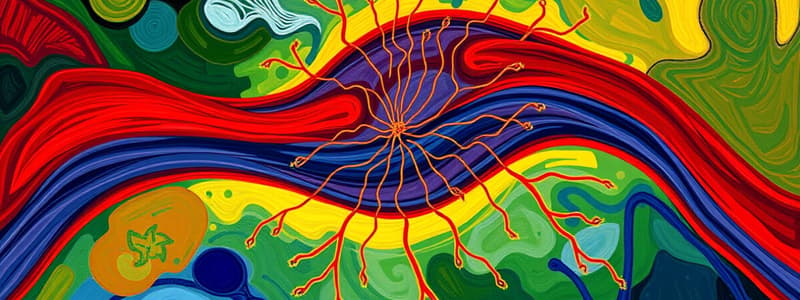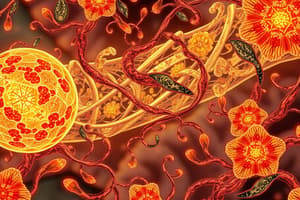Podcast
Questions and Answers
Which syndrome is primarily associated with a microdeletion on the paternal chromosome?
Which syndrome is primarily associated with a microdeletion on the paternal chromosome?
- Intellectual disability
- Fragile X Syndrome
- Prader-Willi Syndrome (correct)
- Down Syndrome
What is a common physical feature of Fragile X Syndrome?
What is a common physical feature of Fragile X Syndrome?
- Large ears (correct)
- Obesity
- Undescended testes
- Simian crease
What condition results from the inability of the testes to descend?
What condition results from the inability of the testes to descend?
- Intellectual disability
- Hypotonia
- Hypogonadism (correct)
- Obesity
Which of the following describes a condition that results from meiotic nondisjunction?
Which of the following describes a condition that results from meiotic nondisjunction?
Which stage occurs in spermatogenesis where primary spermatocytes undergo meiotic divisions?
Which stage occurs in spermatogenesis where primary spermatocytes undergo meiotic divisions?
What condition is characterized by hypotonia and obesity among other symptoms?
What condition is characterized by hypotonia and obesity among other symptoms?
What structures are formed from the inner cell mass during blastocyst development?
What structures are formed from the inner cell mass during blastocyst development?
What happens to the blastomeres with each mitotic division?
What happens to the blastomeres with each mitotic division?
What occurs during days 11 and 12 after fertilization?
What occurs during days 11 and 12 after fertilization?
What initiates the primitive uteroplacental circulation?
What initiates the primitive uteroplacental circulation?
What phase is the uterus in during the time of implantation?
What phase is the uterus in during the time of implantation?
What type of cells do Epiblasts give rise to?
What type of cells do Epiblasts give rise to?
What structure surrounds the primitive yolk sac?
What structure surrounds the primitive yolk sac?
What develops into the trophoblast during blastocyst formation?
What develops into the trophoblast during blastocyst formation?
What role do gap junctions play in smooth muscle tissue?
What role do gap junctions play in smooth muscle tissue?
Which of the following is NOT one of the four families of paracrine signaling factors?
Which of the following is NOT one of the four families of paracrine signaling factors?
What is the primary function of Fibroblast Growth Factors (FGF)?
What is the primary function of Fibroblast Growth Factors (FGF)?
Sonic signaling involves which protein binding to the Patched receptor?
Sonic signaling involves which protein binding to the Patched receptor?
What happens when Patched stops inhibiting Smo during Sonic signaling?
What happens when Patched stops inhibiting Smo during Sonic signaling?
Which organ systems are affected by paracrine signaling during development?
Which organ systems are affected by paracrine signaling during development?
Which of the following statements about Sonic signaling is true?
Which of the following statements about Sonic signaling is true?
Which layer of the endometrium is retained after menstruation?
Which layer of the endometrium is retained after menstruation?
What is the first phase of fertilization?
What is the first phase of fertilization?
Which two layers does the trophoblast differentiate into during development?
Which two layers does the trophoblast differentiate into during development?
What forms the extraembryonic coelom?
What forms the extraembryonic coelom?
Which phase occurs after the penetration of the zona pellucida during fertilization?
Which phase occurs after the penetration of the zona pellucida during fertilization?
What is NOT a role of the corpus luteum?
What is NOT a role of the corpus luteum?
What are the two cavities formed during the early stages of embryonic development?
What are the two cavities formed during the early stages of embryonic development?
What do epiblast cells give rise to?
What do epiblast cells give rise to?
Which structure is a derivative of the ectodermal germ layer?
Which structure is a derivative of the ectodermal germ layer?
What initiates the formation of the notochord?
What initiates the formation of the notochord?
How is the induction of the neural plate regulated?
How is the induction of the neural plate regulated?
Which region's development is influenced by WNT3a and FGF?
Which region's development is influenced by WNT3a and FGF?
Which of the following structures does NOT arise from the ectoderm?
Which of the following structures does NOT arise from the ectoderm?
What is the function of the notochord during embryonic development?
What is the function of the notochord during embryonic development?
What happens to the notochord after it forms during development?
What happens to the notochord after it forms during development?
Flashcards are hidden until you start studying
Study Notes
Smooth Muscle Pattern
- Direct cellular communication occurs via gap junctions.
- Essential in maintaining coordinated function among tightly connected muscle cells in organs like the heart, gut, lungs, and kidneys.
Paracrine Signaling Factors
- Regulate development and differentiation of organ systems.
- Four key families of signaling factors:
- Fibroblast Growth Factor (FGF)
- WNT
- Hedgehog
- Transforming Growth Factor-Beta (TGF-Beta)
Fibroblast Growth Factors (FGFs)
- Promote growth of fibroblasts in culture.
- Possess the ability to produce numerous protein isoforms through RNA splicing or alternate initiation codons.
Intellectual Disabilities and Syndromes
- Fragile X Syndrome is characterized by:
- Intellectual disability
- Large ears and prominent jaw
- Prader-Willi Syndrome features include:
- Hypotonia and obesity
- Intellectual disability
- Hypogonadism with undescended testes
- Developmental issues sometimes arise from meiotic nondisjunction during oocyte formation.
Spermatogenesis
- Involves the maturation of spermatogonia into spermatozoa.
- Primordial germ cells (PGCs) remain dormant until puberty, then differentiate into spermatogonia.
- Primary spermatocytes undergo meiosis to yield four spermatids.
Blastocyst Formation and Development
- Post-fertilization, blastomeres decrease in size after each mitotic division, leading to compaction and the formation of a morula.
- Roughly three to four days post-fertilization, the morula develops into a blastocyst with a developing cavity.
- The inner cell mass differentiates into the embryo, while the outer cell mass forms trophoblast.
Uterus at Time of Implantation
- Uterus enters the secretory phase featuring coiled uterine glands and arteries.
- The blastocyst implants within the endometrium, primarily affecting the anterior or posterior wall.
- In absence of fertilization, the menstrual cycle initiates.
Three Layers of the Endometrium
- Compact layer: sheds during menstruation.
- Spongy layer: also sheds during menstruation.
- Basal layer: retained and regenerates during the next cycle.
Corpus Luteum
- Formed from the empty follicle post-ovulation, producing progesterone during early pregnancy.
- Plays a role in ovulation regulation and menstrual cycle regulation.
Phases of Fertilization
- Phase 1: Penetration of the corona radiata.
- Phase 2: Penetration of the zona pellucida.
- Phase 3: Fusion of the oocyte and sperm cell membranes.
Actions During Phase 3
- Membranes of oocyte and sperm fuse, leading to the formation of a zygote.
- Establishment of three primary germ layers: endoderm, mesoderm, and ectoderm, from epiblast cells.
Derivatives of the Ectodermal Germ Layer
- Ectoderm gives rise to structures in contact with the external environment:
- Central Nervous System (CNS)
- Peripheral Nervous System (PNS)
- Sensory epithelium of the ear, nose, and eye
- Skin, hair, and nails
- Glands (pituitary, mammary, sweat)
- Enamel of teeth
Formation of the Notochord
- Prenotochordal cells advance toward the prechordal plate, intercalating into endoderm to form the notochordal plate, which later becomes the notochord.
- Establishes the midline axis for embryonic development and axial skeleton foundation.
Studying That Suits You
Use AI to generate personalized quizzes and flashcards to suit your learning preferences.



